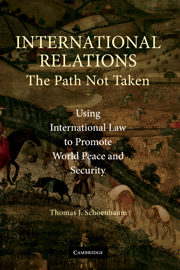Book contents
- Frontmatter
- Contents
- Preface and Overview
- 1 Introduction: Two Very Different Wars in Iraq
- 2 The Twenty-First Century – The End of History or a New Beginning?
- 3 International Power Politics
- 4 A New Global Order Based on International Law and Multilateralism
- 5 Peace and Security: Reinventing the United Nations
- 6 International Political Economy
- 7 International Environmental Protection
- 8 International Human Rights
- 9 International Crimes
- 10 Conclusions
- Index
Preface and Overview
Published online by Cambridge University Press: 23 July 2009
- Frontmatter
- Contents
- Preface and Overview
- 1 Introduction: Two Very Different Wars in Iraq
- 2 The Twenty-First Century – The End of History or a New Beginning?
- 3 International Power Politics
- 4 A New Global Order Based on International Law and Multilateralism
- 5 Peace and Security: Reinventing the United Nations
- 6 International Political Economy
- 7 International Environmental Protection
- 8 International Human Rights
- 9 International Crimes
- 10 Conclusions
- Index
Summary
This book advances a simple but highly controversial thesis: International law and international institutions must be the focal points of foreign policy and international relations for all countries. Indeed, they should now be consciously employed to create a new global order in international relations. This thesis, termed “liberal internationalism” by specialists, is controversial because international law and institutions are regarded as having failed badly in the twentieth century after World War I and both are regarded by many as weak and of marginal significance today.
In the chapters that follow, my task is to convince readers that international law and institutions have matured over the past half-century to the point where they now have a proven record of usefulness and accomplishment. Both are also admittedly far from perfect and have obvious flaws. But the question is, What to do about these flaws and failings? My argument is that the way forward is not to ignore and deprecate international law and institutions but to reform and improve them. In other words, the glass is half full, rather than half empty.
My argument assumes that states, which are still central to international society, are rational actors that have interests and seek to further those interests. But I argue that there has been a paradigm shift in how states view their interests. The traditional approach to state-interests theory is to assume that individual interests predominate.
- Type
- Chapter
- Information
- International RelationsThe Path Not Taken, pp. vii - xviPublisher: Cambridge University PressPrint publication year: 2006



